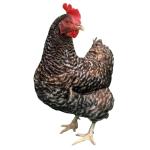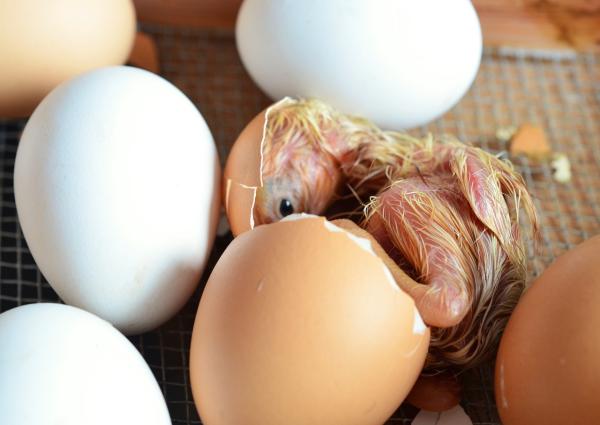How Often Do Chickens Lay Eggs?



See files for Hens and roosters
Chickens are one of the most popular livestock animals in the world, and for good reason. They are relatively easy to care for and provide us with fresh eggs, which are a delicious and nutritious food source. Chickens typically start laying eggs at around five months of age, and they will lay eggs for several years. The number of eggs that a chicken lays will vary depending on a number of factors, including breed, age, health, and environment.
In this AnimalWised article, we'll explore how often chickens lay eggs and look at the different factors that affect it. We'll also give you some helpful tips on how to increase your hens' egg production.
How do hens lay eggs
Eggs are a delicious and versatile food that people enjoy all over the world. But what do you know about how hens lay eggs?
It all starts with a hen's ovum, or egg cell. The ovum is released from the hen's ovary and travels down the oviduct, where it may or may not be fertilized by a rooster's sperm. If the ovum is fertilized, it will develop into a chick. If the ovum is not fertilized, it will still develop into an egg, but it will not hatch. But even if there is no rooster present, a hen will still lay eggs.
Unfertilized eggs are just as safe to eat as fertilized eggs. In fact, most of the eggs that we buy in grocery stores are unfertilized.
How do chickens lay eggs without a rooster?
Hens lay eggs regardless of whether or not there is a rooster present. This is because hens ovulate naturally, regardless of whether they have mated with a rooster. Even if a hen has mated with a rooster, there is a chance that the egg will not be fertilized. This can happen for a variety of reasons, such as if the sperm is not viable or if the ovum is not mature.
It is worth noting that hens do not know whether their eggs are fertilized or unfertilized. They will sit on any egg, regardless of whether it is fertilized or not. This is because hens have a natural instinct to brood, or sit on their eggs, in order to keep them warm and protected.
The broody instinct is triggered by a number of factors, including the hen's hormones, the length of daylight hours, and the presence of a nest. Once a hen becomes broody, she will stop laying eggs and will instead focus on incubating her eggs.
The incubation period for chicken eggs is 21 days. If the egg is fertilized, the chick will hatch after 21 days. However, if the egg is unfertilized, the chick will not hatch.
Curious about the role chickens have played in human culture and history? Then do not miss this other article that explores the many ways in which chickens have been used and valued by humans throughout the ages.

Do chickens lay eggs every day?
Chickens do not lay eggs every day. It takes a hen about 24-26 hours to produce and lay an egg, so most hens will lay approximately one egg every day or two.
However, there are a number of factors that can affect a hen's egg-laying frequency, including:
- Age: hens typically start laying eggs at around five months of age. Under optimal conditions, they can maintain a steady rate for a few years (usually up to two), but as they age, egg production gradually declines until it ceases altogether, as they become infertile.
- Breed: different chicken breeds have varying levels of egg production. Some breeds, such as Leghorns and Rhode Island Reds, are prolific layers, while others, such as Cochins and Silkies, produce fewer eggs.
- Feeding: proper nutrition is essential for egg formation. Hens need a balanced diet that includes protein, carbohydrates, fats, vitamins, and minerals. Inadequate diets can result in malformed eggs, soft shells, or a complete halt in production.
- Climate: hens require a specific number of daylight hours to lay eggs. Consequently, in the Northern Hemisphere, egg-laying is concentrated in the spring and summer, decreasing or ceasing during the colder months. Additionally, excessive heat during the summer can disrupt egg production.
- Health: sick hens often stop laying eggs. It's important to keep your hens healthy and vaccinated against common chicken diseases. If you notice any changes in your hen's egg-laying habits, consult with a veterinarian to rule out any underlying health issues.
- Molting: hens typically undergo molting, shedding their feathers once a year, usually towards the end of summer. During this period, which can last for a few weeks to several months, egg production is affected.
- Stress: environmental factors and management practices can impact egg production. Poor management, such as confining hens in small spaces, limiting their access to the outdoors, overcrowding, intra-flock conflicts, and the presence of potential predators, can all contribute to decreased egg-laying. Proper care and husbandry practices are essential to optimize egg production.
In addition to these factors, the time of year can also impact a hen's egg-laying frequency. Hens typically lay more eggs in the spring and summer months, when there are more daylight hours. In the fall and winter months, hens lay fewer eggs, or may stop laying eggs altogether.

At what time of day do chickens typically lay eggs?
Egg-laying in hens typically occurs during the morning hours. The precise timing can vary among individual hens, with some being early risers, laying their eggs at dawn, while others may delay until midday or slightly later.
This timing is closely tied to the duration required by a hen's body to develop an egg fully. After laying an egg, the hen embarks on a new cycle of egg formation and eventual expulsion, a process that spans many hours, essentially taking up the better part of another day.
Consequently, egg-laying is commonly observed during the morning hours and tends to follow a consistent schedule, occurring at roughly the same time each day.
Concerned about your chickens eating their own eggs? This article provides a comprehensive overview of the issue, including causes, prevention, and treatment.
What to do if your chicken stops laying eggs
As we have seen in the previous section, there are many factors that influence egg-laying in hens, including age, breed, stress, health, and seasonal variations.
Some of these factors are physiological, meaning they are normal and do not require intervention. For example, hens younger than five months or older may not lay eggs simply because they are not yet fertile or have stopped ovulating. During the winter or periods with limited daylight hours, egg-laying may decrease or cease altogether. The same can occur during molting or in excessively hot weather.
However, if a hen that should be laying eggs is not, it is important to reconsider its living conditions and diet. It is likely that adjustments are needed to improve its situation, and once addressed, egg-laying should resume.
If any doubts arise or if clinical signs indicative of illness are observed, such as feather loss, parasites, breathing difficulties, mobility issues, anorexia, or weight loss, it is essential to seek the advice of a veterinarian.
To keep your chickens healthy and happy, it is essential to be aware of the most common chicken diseases. This article provides a comprehensive overview of 15 common chicken diseases, including their causes, symptoms, and treatments.
Tips for helping your hens lay more eggs
- Provide them with a balanced diet that includes plenty of protein and calcium.
- Make sure they have access to clean water at all times.
- Provide them with a safe and comfortable place to live, with plenty of room to roam.
- Reduce stress by giving them access to the outdoors and minimizing overcrowding.
- Collect eggs regularly. This helps to stimulate the hen to lay more eggs.
With proper care and husbandry, your hens can lay eggs for many years.
Ever wonder why your chickens lay eggs? This article explains how chicken reproduction works, from mating to egg laying.
If you want to read similar articles to How Often Do Chickens Lay Eggs?, we recommend you visit our Facts about the animal kingdom category.
- Institute of Egg Studies: Egg Formation , available at https://www.institutohuevo.com/formacion_huevo/







